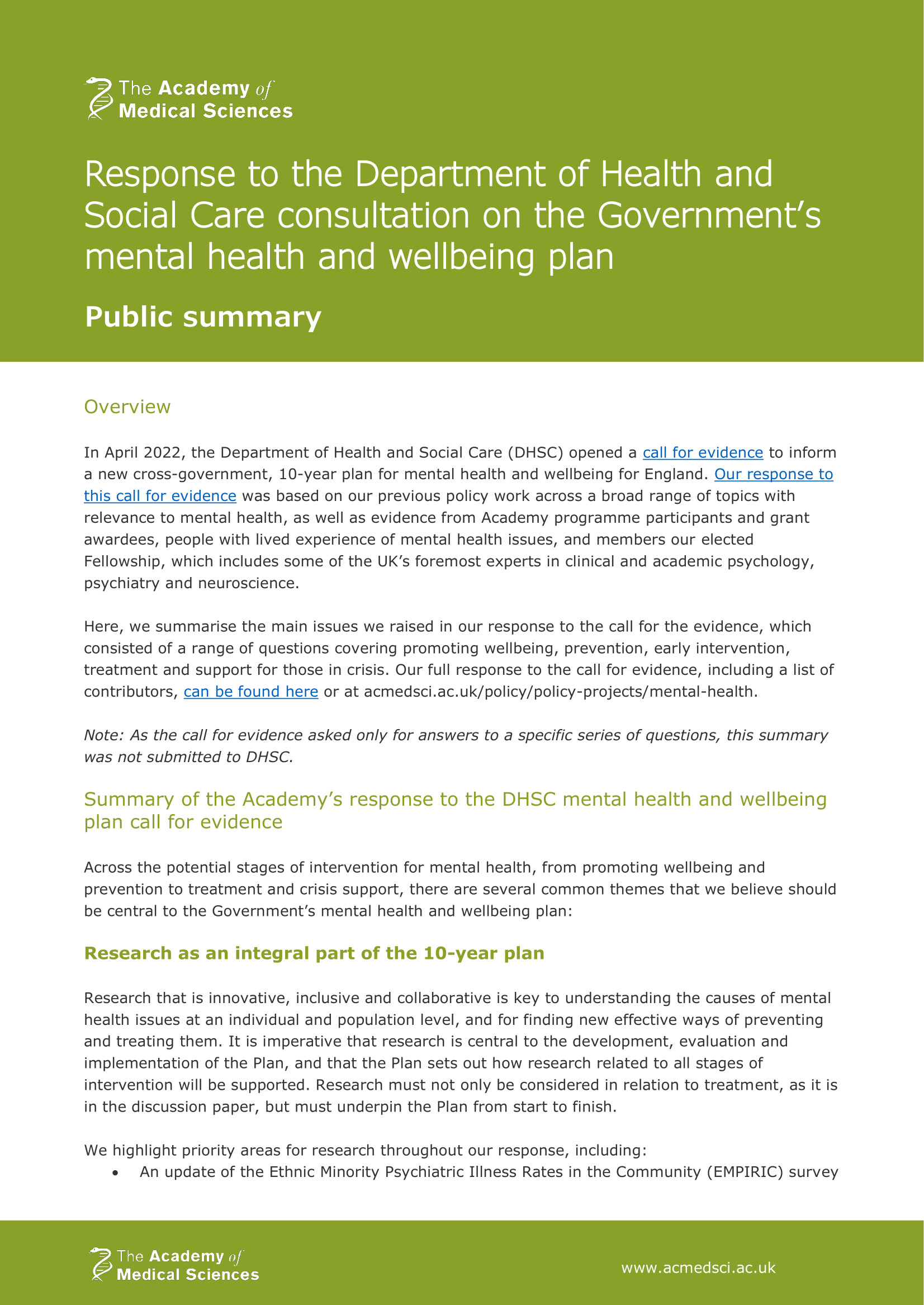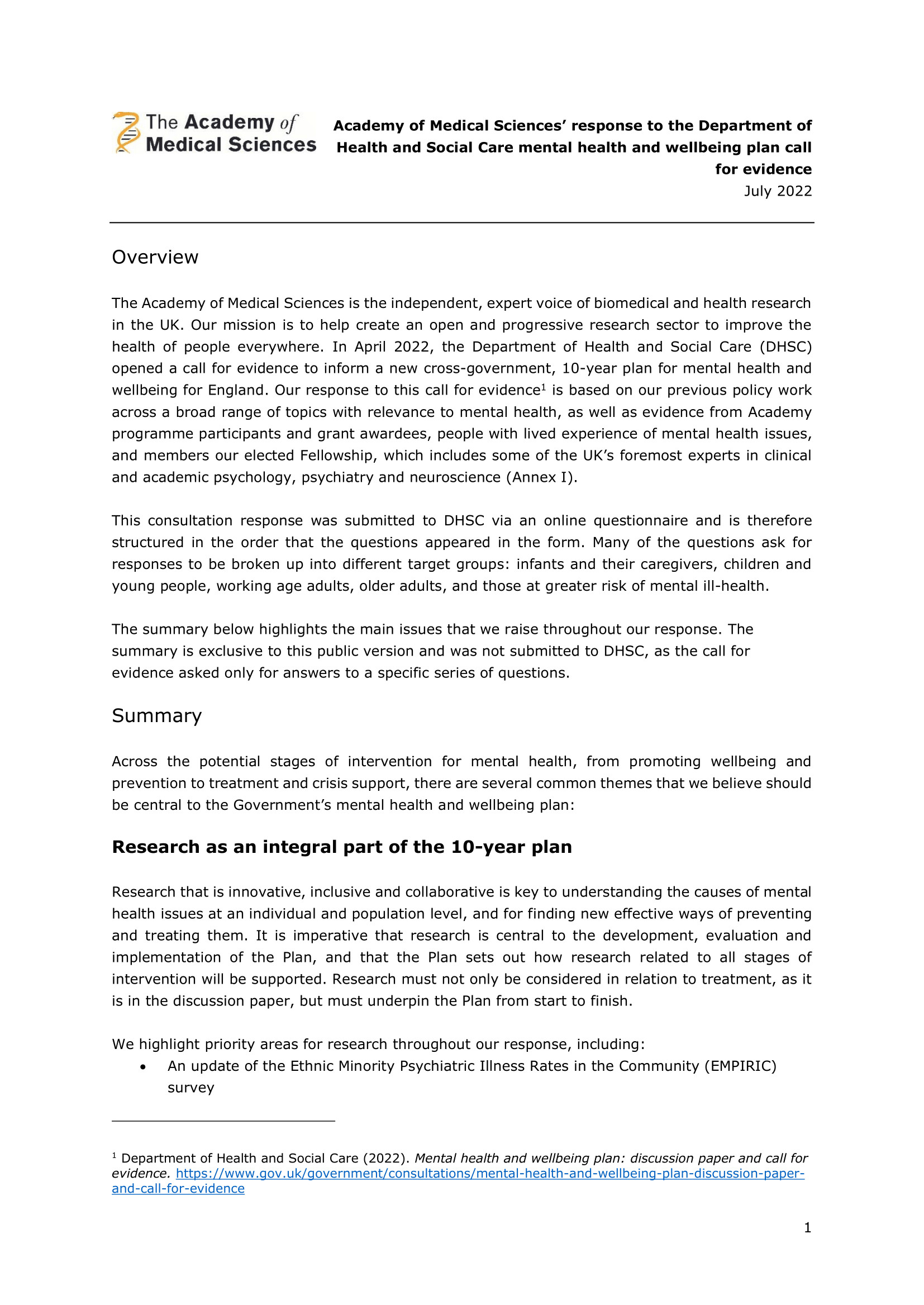The Academy of Medical Sciences has recently responded to the Government’s consultation on their upcoming 10-year mental health and wellbeing plan for England.
Here Professor Ed Bullmore FMedSci, Professor of Psychiatry, University of Cambridge shares a summary of the main points in our response and public summary.
Over the past decade, the conversation on mental health has been opening up, with public campaigners fighting stigma on a national level, and a progressive change of culture that has made it more acceptable for individuals to talk about challenges with their mental health.
These advances in how we think and talk about mental health have not yet been matched by advances in diagnosis and treatment for people with mental health disorders. More needs to be done to involve patients and the public in research in a nuanced way that reflects the complexities of mental health experiences. We need to reduce the gap between the supply and demand for mental health services. And there needs to be greater collaboration across government and between public, private and third sectors.
Therefore, we welcomed the Government’s work on a 10-year plan for mental health and wellbeing and, in preparing our response, we consulted a broad spectrum of opinion, including experts by experience (people with lived experience of mental health issues), our Fellows, and researchers from our networks across a range of career stages.
We are asking Government to prioritise the following five points in the development of their new plan.
1. More research is needed to drive advances in all mental health treatment pathways, from promoting wellbeing to crisis support
The Government's plan will cover different stages of intervention from promoting wellbeing, to prevention and treatment. Research is needed for the development, evaluation, and implementation of effective interventions in all of these areas.
According to a report by the mental health charity MQ, funding for mental health research remained flat between 2008 and 2017, with just over £9 spent on research each year per person affected by mental illness between 2014-2017 (compared to £228 per patient with cancer). Only 2.7% of this research funding came from public donations (compared to 68% for cancer).
The Government should work with medical research charities, alongside patients and the public, researchers, and healthcare workers, to make sure that funding is focused on the areas of unmet research need. Three research priorities, amongst others, identified by our Fellows and researchers were: long-term studies of environmental and genetic risk factors for poor mental health; research to evaluate the effectiveness of social and digital interventions; and the causes of increasing rates of mental ill-health in children and young people.
Allowing clinicians to perform research enhances NHS staff recruitment and retention and reduces burnout, while patients in research-active healthcare settings receive better care. To ensure all mental health patients and staff can benefit from new research, research needs to be fully integrated within the healthcare system.
And in order for research findings to apply to the general population, we need to identify and remove barriers that prevent under-represented groups from participating in mental health research, including Black and ethnic minority groups, people with more severe mental health issues, and children and young people from disadvantaged communities.
2. More meaningful involvement of patients, their carers, and the public
Patient and public involvement (PPI) should be a vital component of the development, implementation, and evaluation of the Government’s plan. Meaningful PPI involves engaging patients, carers and the public in the design and delivery of research studies, and the innovation of new mental health services. This process of co-production can foster trust between service providers and communities, encouraging better engagement with mental health services and leading to mental health research of more direct relevance to the people most likely to benefit.
Successful patient involvement requires discussions about moving towards co-production, avoiding tokenism, ensuring a diverse range of voices are represented, and removing barriers to participation.
Meaningful and genuine dialogue must result in outcomes that reflect the complex realities and intersecting identities of ethnicity, gender, disability, sexuality, and other protected characteristics of the people within local communities.
Our consultation response involved patients with lived experience of mental health issues.
"As a young person, I hated talking about mental health to adults. That is why it is important to take a person-centred approach, involving people with lived experience in mental health in the delivery of training for medical staff and the design of services." Noah Carey Roberts, young person with lived experience of mental health who contributed to the consultation response
3. Reducing demand for mental health services through a holistic approach to prevention
The Government must work to minimise the ‘mental health gap’ between service demand and supply by both reducing demand through prevention and boosting supply by improving access to services.
Social determinants of health include economic and social factors such as poverty, unemployment, and housing insecurity. Without adequate policies to address these fundamental factors, other strategies aimed at preventing mental health issues will have limited impact.
We need to build resilient communities that promote mental wellbeing with adequate support systems to address the differences between communities in their exposure to these social determinants in the longer term.
The cost-of-living crisis is likely to worsen the impact of social and economic inequalities on mental health, making it even more urgent to address these issues.
4. Investing in and building the workforce for mental health research and innovation
To increase access to innovative services, it is important to retain and support the current NHS workforce, and to increase the capacity for mental health research and service development in the public sector. This includes all relevant professional groups: psychiatrists, mental health nurses, social workers, school and university nurses and counsellors, psychologists, and psychotherapists.
As well as increased funding for the workforce, there is also a need for greater focus on training, career development support, and fostering a research-active culture that will encourage talented and motivated staff to contribute effectively to the challenges of improving mental health.
A major barrier to research and innovation-driven improvements in mental health prevention and care is the lack of clinical workforce capacity. Strengthening the mental health workforce will also enhance capacity for research, as it will allow clinical academics to prioritise research alongside their clinical duties.
5. Working together across government departments
Many of the social determinants of health lie outside of the boundaries of the healthcare system, so the most effective way to address mental health strategically is by coordinated action across areas such as social care, education, work, justice and public health. Improving the ability of these sectors to share data will allow them to work together better.
It is also important for the Government to coordinate across relevant departments, including the Department for Education, the Department for Work and Pensions, Department of Health and Social Care, the Department for Business Energy and Industrial Strategy, the Ministry of Justice and the Office for Health Improvement and Disparities, and to clarify the structures that will drive even better cross-working to achieve the common goal of improved mental health.
In conclusion
We believe that only by focussing on these and other proposals set out in our full response to this consultation process will we see a step-change in the way we prevent, diagnose, and treat mental health disorders.
The Academy of Medical Sciences’ new 10-year strategy has mental health as a priority area. We will continue to work to improve mental health in the UK and globally by working with those with lived experience, researchers, the NHS, industry, and policymakers to tackle the biggest challenges.
Find out more about our policy work on mental health and support our work to create an open, progressive and diverse medical research community to improve lives.

